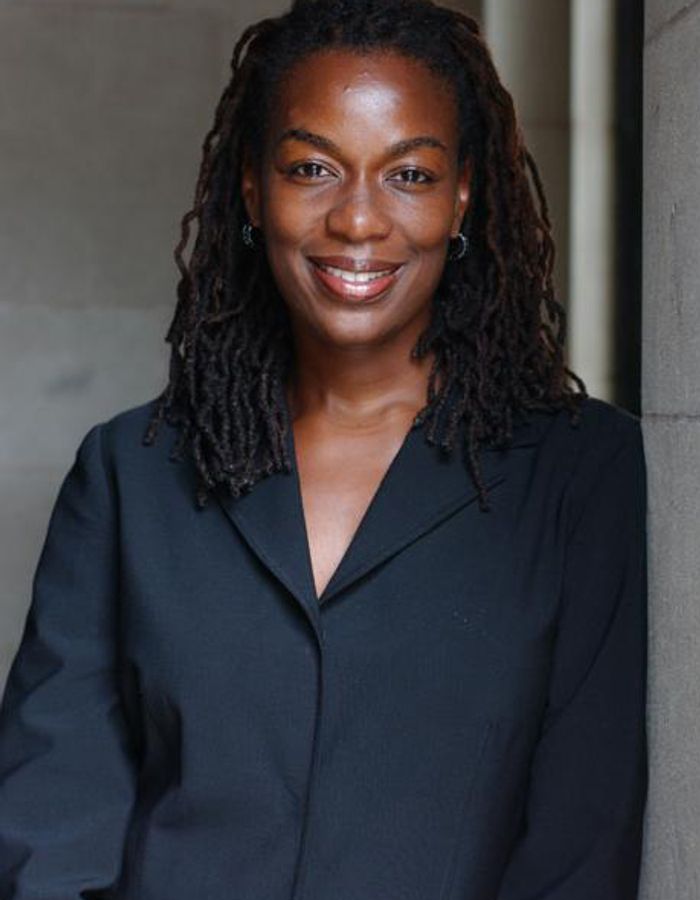Behind the numbers: Lightful’s take on the 2025 Charity Digital Skills Report
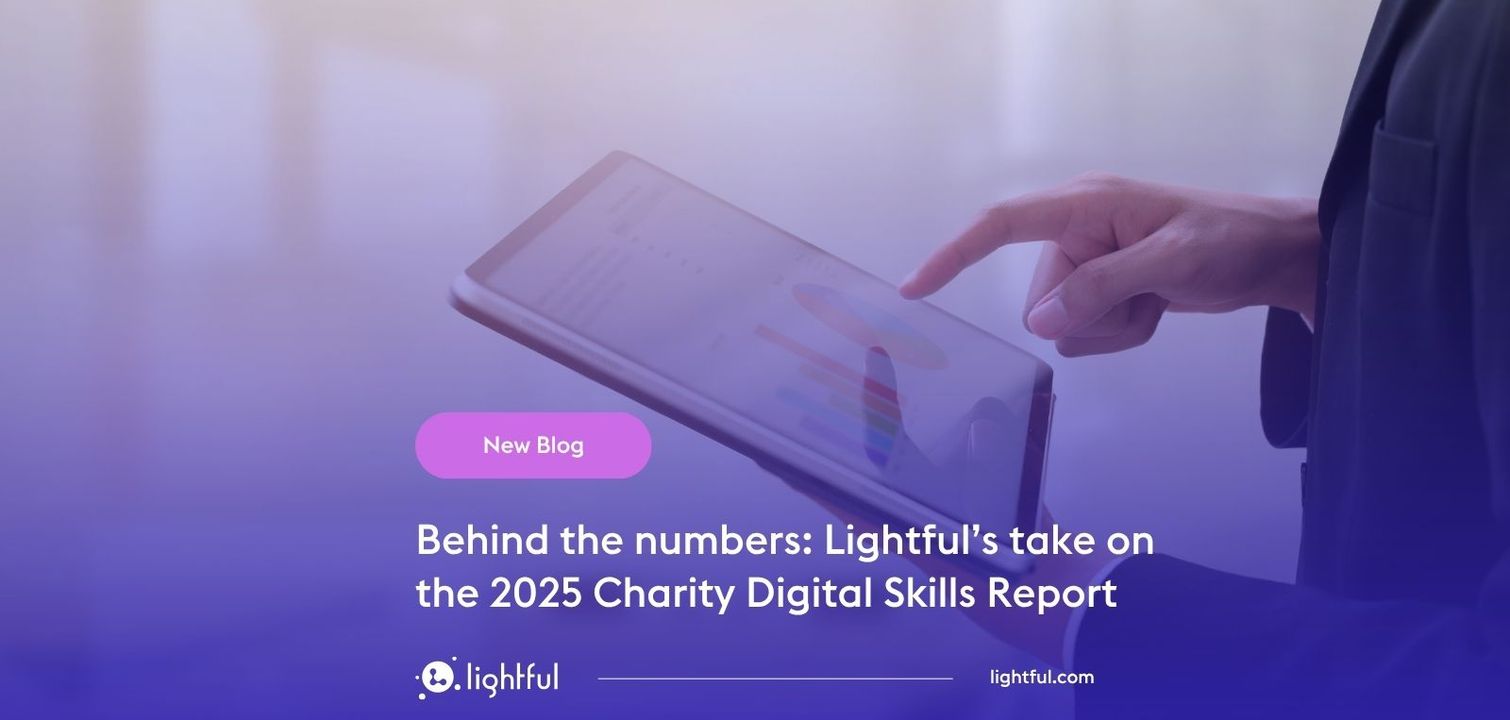
Advancing digital maturity: what Lightful has learned from supporting 3,500 charities globally
This year’s Charity Digital Skills Report shows that progress on digital maturity is stalling. Just 44 percent of UK charities say they are advancing or advanced in their use of digital. Among small charities, this falls to 32 percent. Worryingly, this data is on a downward trend, and has been decreasing each year since 2022.
These findings mirror what we have seen globally. Through our six month BRIDGE programme, Lightful has supported over 3,500 charities from more than 120 countries to build their digital confidence and skills. When charities join BRIDGE, just 34 percent identify as being at the advancing or advanced stages of digital maturity. After six months of structured learning and practical application, this figure rises to 73 percent.
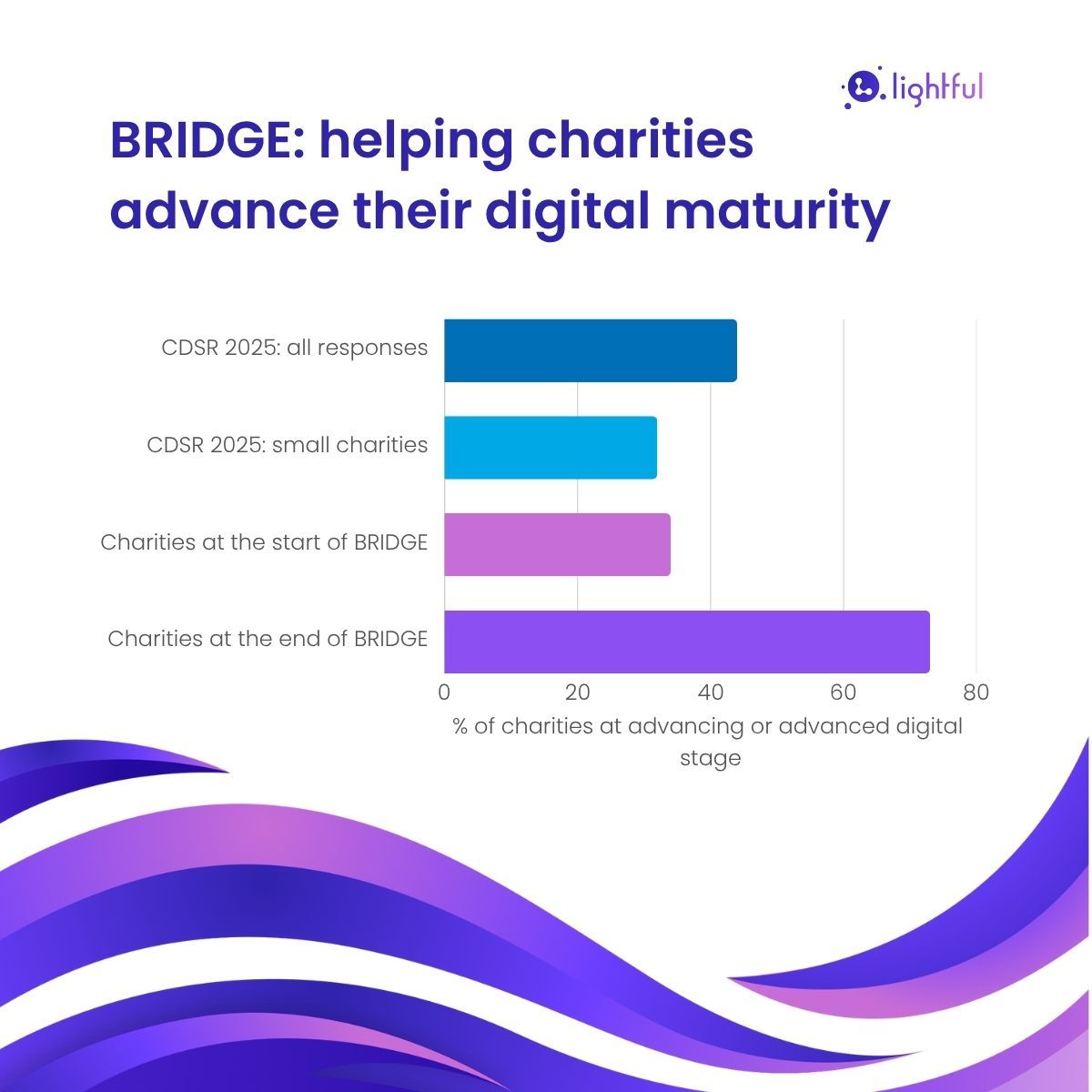
Many charities are still struggling to improve, even after the rapid digitisation prompted by the pandemic. But our results show that progress is possible, and that there are effective ways to support it.
Mind the gap: what helps charities move forward?
One clear takeaway in this report is that charities need more support and training: (50% said funding for training for staff and volunteers on digital or data is needed, up from 43% last year. Ideally, that support is funded and championed by grantmaking foundations. Based on our experience, effective support tends to share these five characteristics:
1. Meet charities where they are
Ask them where they feel least confident and where support would be most useful. Encourage self-assessment using a digital maturity index to help prioritise learning goals and identify blind spots.
2. Make learning practical
One-off webinars or toolkits often fail to stick. The most successful programmes integrate learning into real work, using live campaigns, fundraising goals or service delivery needs to anchor digital skills development.
3. Invest for the long term
Progress takes time. Digital maturity is not a static checklist but a continuous process. Mid to long-term support, with coaching and iteration, gives organisations the space to grow sustainably.
4. Be realistic about capacity
Lack of time and headspace is a major barrier. Learning offers need to be flexible and well-scaffolded so that charities can participate meaningfully without being overwhelmed.
5. Align support with motivation
The most progress comes from organisations that are eager to learn. Where possible, tie digital support to delivery funding or incentives, such as matched funding for fundraising, to help maintain momentum.
Reflections for funders
We welcome the CDSR’s calls to action for funders and would add one more. Be bold in making long-term investments in building resilience through increased digital capacity. Go beyond funding by offering networks, platforms and strategic advice. At the same time, remain aware that digital maturity is a journey for funders too.
Indeed we have seen powerful results when funders join their grantees in learning programmes. This helps shift power dynamics and build deeper relationships based on shared experience.
A recent BRIDGE cohort focused on climate justice included both charities and funders. One of these was the UK-based foundation Gower Street, whose grantees had identified digital skills development as a core need.
“We supported our grantees to take part in BRIDGE because we recognised the need for more than just one-off training. BRIDGE offered a pathway to long-term digital resilience, helping participants strengthen their digital foundations, build confidence using AI, and see digital not just as a tool but as a strategic enabler to future-proof their work. The result? Better engagement, stronger fundraising, and greater impact across the board.” — Tessa Durham, Co Director, Gower Street
The digital disconnect
The Charity Digital Skills Report data shows that charities are eager for tailored support. Without increased investment, the digital divide will continue to grow between large and small organisations and between the charity sector and others.
This year’s Charity Digital Skills Report reveals a troubling contradiction. While nearly two-thirds of charities say they’re making progress with digital, only 32% of small charities have a digital strategy in place. That’s not just a missed step - it’s a missed opportunity. Establishing a deliberate, well-thought-out strategy turns ad-hoc use of digital and AI into something that’s potentially transformative. It enables organisations to tell their story more powerfully, run more effective campaigns and raise vital funds.
Charities hold extraordinary levels of trust in the communities they serve. But they’re also facing soaring demand, shrinking income and stretched capacity. That’s why they must be supported with the right tools and training to make the most of the opportunities ahead. From our work not only in the UK but across 100+ countries, we see that those who build digital confidence and skills are better able to meet these challenges. We’re proud to support this important report and hope it prompts more funders to build resilience in the long-term, where it’s needed most. — Vinay Nair, CEO & Co-Founder, Lightful
As the use of generative AI and new technologies increases, this need is only going to grow. And with the right investment in digital learning and strategic capacity building, charities can move rapidly through the digital stages identified in the Report, to become confident, strategic use of digital and AI.
Latest articles
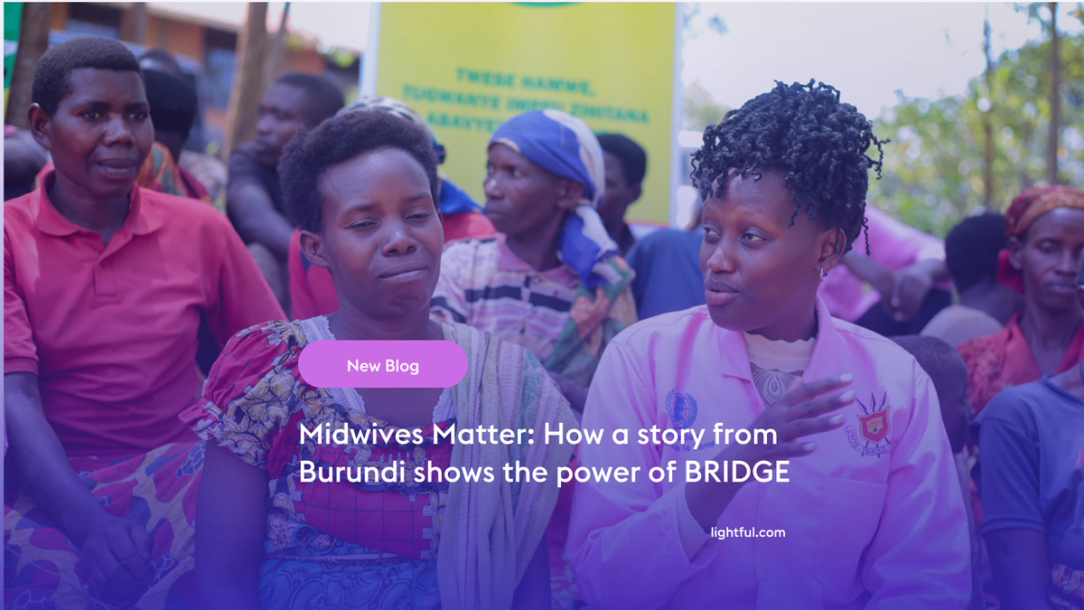
Over the past year, Lightful and the International Confederation of Midwives (ICM) have supported Midwives Associations across Africa, South Asia and the Eastern Mediterranean to build their digital confidence through our BRIDGE programme. These organisations were starting from very different places, but all shared the same goal: to use digital tools to strengthen their voice, raise their visibility and advocate for better outcomes for women and babies.
Related posts
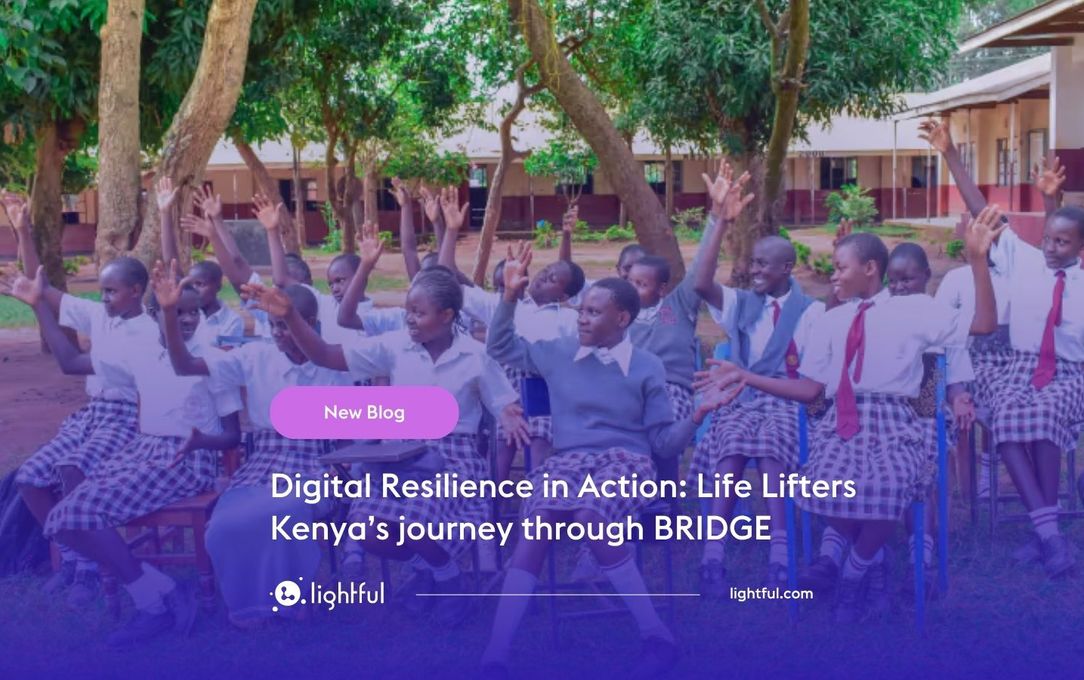
In today’s rapidly evolving digital landscape, the ability to engage online is a necessity. For nonprofits, especially those working in underserved regions or tackling complex social issues, digital tools can be the bridge between intention and impact. Whether it’s reaching new donors, advocating for policy change, or delivering services, digital capacity enables organisations to scale their mission and deepen their impact. Yet many grassroots organisations remain digitally under-resourced. That’s why Lightful created the BRIDGE programme - Building Resilience in Digital Growth and Engagement - to empower nonprofits with the skills, confidence, and strategies to thrive in the digital age and build lasting change.
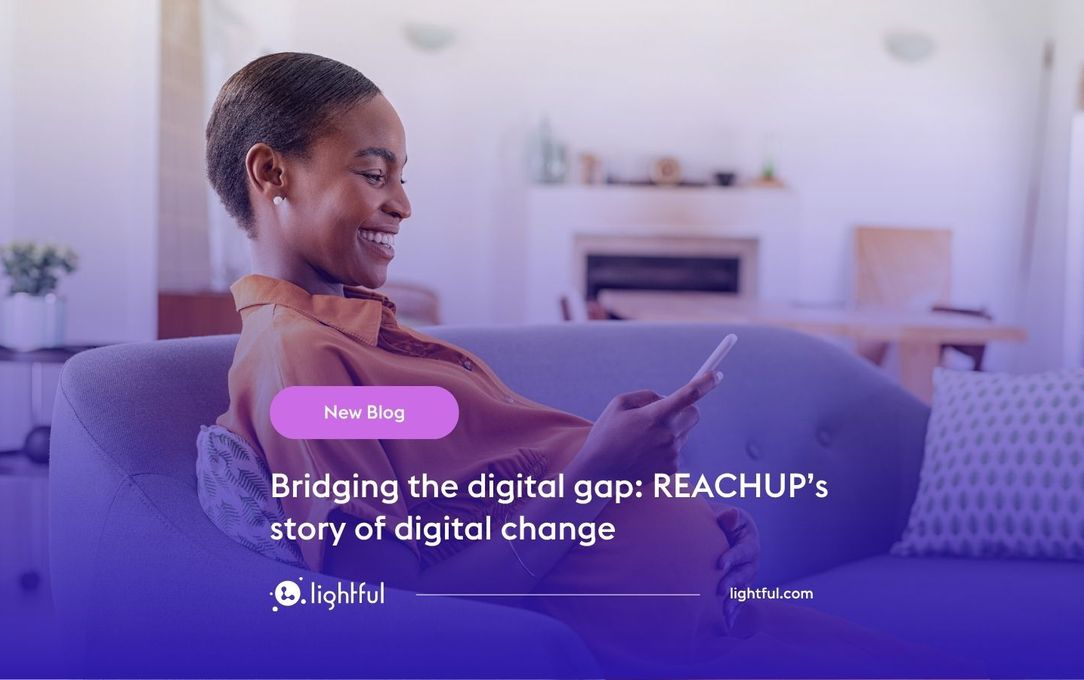
“We knew we had a powerful mission, but we needed people outside of our immediate community to know who we were.”
See who we help
Contact us
Want to learn more?
Email Jonathan and start a conversation






